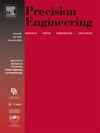Design and testing of a two-axis surface encoder with a single Littrow configuration of a first-order diffraction beam
IF 3.5
2区 工程技术
Q2 ENGINEERING, MANUFACTURING
Precision Engineering-Journal of the International Societies for Precision Engineering and Nanotechnology
Pub Date : 2024-10-31
DOI:10.1016/j.precisioneng.2024.10.019
引用次数: 0
Abstract
A simple but effective optical design is proposed to expand the measurement range of a surface encoder in the out-of-plane Z-direction, which had been much shorter than that in the in-plane X-direction. A zeroth-order and a first-order diffraction beams generated at a transparent grating are projected onto a parallelly aligned scale grating. The reflected zeroth-order beam from the scale grating interferes with a beam from a reference plane mirror for the Z-directional measurement over an expanded range of 13 mm. A single Littrow configuration is established for the first-order diffraction beam to travel to and from the scale grating on the same path so that it can interfere with the reflected zeroth-order beam for the X-directional measurement regardless of the Z-position of the scale grating. A prototype sensor is constructed for demonstrating the effectiveness of the proposed optical design for expansion of Z-range. Uncertainty analysis on the measurement results is also conducted.
使用一阶衍射光束的单利特罗配置设计和测试双轴表面编码器
表面编码器在平面外 Z 方向的测量范围比在平面内 X 方向的测量范围短得多,本文提出了一种简单而有效的光学设计,以扩大表面编码器在平面外 Z 方向的测量范围。在透明光栅上产生的零阶和一阶衍射光束被投射到平行排列的刻度光栅上。来自刻度光栅的零阶反射光束与来自参考平面镜的光束发生干涉,从而在 13 毫米的扩大范围内进行 Z 方向测量。一阶衍射光束在同一路径上往返于刻度光栅之间,因此无论刻度光栅的 Z 位置如何,一阶衍射光束都能与用于 X 方向测量的反射零阶光束发生干涉。我们制作了一个传感器原型,以展示拟议光学设计在扩大 Z 范围方面的有效性。此外,还对测量结果进行了不确定性分析。
本文章由计算机程序翻译,如有差异,请以英文原文为准。
求助全文
约1分钟内获得全文
求助全文
来源期刊
CiteScore
7.40
自引率
5.60%
发文量
177
审稿时长
46 days
期刊介绍:
Precision Engineering - Journal of the International Societies for Precision Engineering and Nanotechnology is devoted to the multidisciplinary study and practice of high accuracy engineering, metrology, and manufacturing. The journal takes an integrated approach to all subjects related to research, design, manufacture, performance validation, and application of high precision machines, instruments, and components, including fundamental and applied research and development in manufacturing processes, fabrication technology, and advanced measurement science. The scope includes precision-engineered systems and supporting metrology over the full range of length scales, from atom-based nanotechnology and advanced lithographic technology to large-scale systems, including optical and radio telescopes and macrometrology.

 求助内容:
求助内容: 应助结果提醒方式:
应助结果提醒方式:


